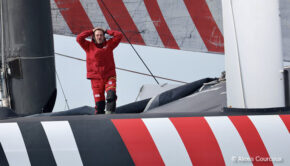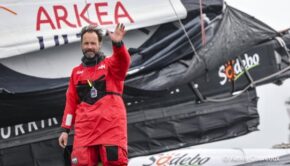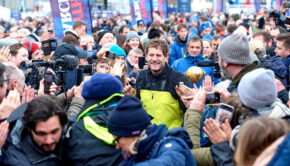Records and retirement in Arkea Ultim Challenge
Published on January 29th, 2024
(January 29, 2024; Day 23) – Race leader Charles Caudrelier in the 2024 Arkea Ultim Challenge-Brest yesterday set a new solo record time for the passage of the Indian Ocean between Cape Agulhas in South Africa and the longitude of Tasmania. On the Maxi Edmond de Rothschild, Caudrelier completed the passage in 08:08:20:23 for an average speed in the Indian Ocean of 30.7 knots.
While Caudrelier makes good time, four of the six skippers who started the non-stop round-the-world race on January 7 have had technical issues and today came the confirmation of the first official retirement from the race.
Tom Laperche on Trimaran SVR-Lazartigue and his team realized they don’t have the facilities or the means to complete the complex, difficult repair needed, and they have no option but to retire and get their boat back to Concarneau. Laperche incurred damage on January 18 when his daggerboard in the main hull collided with an UFO (unidentified floating object). He had arrived in Cape Town on January 22 in hopes to repair the damage.
Here is the position report:
1. Charles Caudrelier (FRA), Maxi Edmond de Rothschild (2017 Verdier 32/23)
2. Thomas Coville (FRA), Sodebo Ultim 3 (2019 VPLP/others 32/23)
Damage on January 17 to starboard foil lowering system limited its use but reported on January 29 that he had regained full use out his foils. UPDATE: Coville will stop in Hobart on Jan. 31 to repair bow pulpit and port-side netting.
3. Armel Le Cléac’h (FRA), Maxi Banque Populaire XI (2021 VPLP 32/23)
Completed on January 16 a 27-hour pitstop in Recife, Brazil to repair bow pulpit and correct an issue with the hydraulics on the starboard foil.
4. Anthony Marchand (FRA), Actual Ultim 3 (2015 VPLP 30/22)
Collision on January 23 damaged port foil, and went to Cape Town to remove it, completing a 24 hour technical stopover on January 27.
5. Éric Péron (FRA), Trimaran Adagio (2014 VPLP 31/21)*
The starboard rudder system was damaged on January 25, and completed a 24 hour technical stopover to make repairs in Cape Town on January 29.
6. Tom Laperche (FRA), Trimaran SVR-Lazartigue (2021 VPLP 32/23)
Retired January 29.
Under Australia, Coville and Le Cléac’h have to deal with a nasty low pressure system to their south, Caudrelier is not finding the Pacific any more peaceful than the Indian Ocean and Marchand is looking to deal with an anticyclone as he leaves Cape Town in his wake.
Details: https://arkeaultimchallengebrest.com/en
The Ultim Class trimarans have a maximum length of 32 meters and a maximum width of 23 meters.
The solo speed record around the world was set in 2017 by François Gabart (FRA) on the 30m Macif trimaran in a time of 42d 14h 40m 15s for an average speed of 21.08 knots. This yacht has been rebranded and will be raced by Marchand.
Entrants:
• Charles Caudrelier (FRA), Maxi Edmond de Rothschild (2017 Verdier 32/23)
• Thomas Coville (FRA), Sodebo Ultim 3 (2019 VPLP/others 32/23)
• Tom Laperche (FRA), Trimaran SVR-Lazartigue (2021 VPLP 32/23)
• Armel Le Cléac’h (FRA), Maxi Banque Populaire XI (2021 VPLP 32/23)
• Anthony Marchand (FRA), Actual Ultim 3 (2015 VPLP 30/22)
• Éric Péron (FRA), Trimaran Adagio (2014 VPLP 31/21)*
* Only entrant without foiling appendages
Five rules from the Sailing Instructions:
• The start is January 7 from Brest, France. The start line is kept open for 168 hours and the finish line is closed after an elapsed time of 100 days after the start time, that is to say April 16, 2024.
• The skippers can communicate and exchange with their teams on shore, so they have the freedom to get weather information and be routed by their team on shore and get technical help and advice to help with technical problems.
• The solo skippers can stop but there are two distinct operations. A technical stop is unassisted and requires the sailor to drop anchor, take a mooring, or tie up alongside an anchored or moored boat with no external help. There is no time penalty for a technical stop. But for a technical stopover (escale technique) where one or more crew or technical team come on board to help, there is a mandatory 24 hours minimum. This does not apply to the start port of Brest where all means are authorized to reach or leave the port within a radius of 50 miles.
• For the first time in ocean racing, zones where there are known to be a high concentration of whales and sea mammals are determined. Establishing these zones should both protect the marine wildlife and reduce the chance of a collision. These zones are around the Azores, the Canaries, south of South Africa, the Kerguelens, and parts of the Antarctic.
• There are ice exclusion zones to protect the skippers and their boats.









 We’ll keep your information safe.
We’ll keep your information safe.